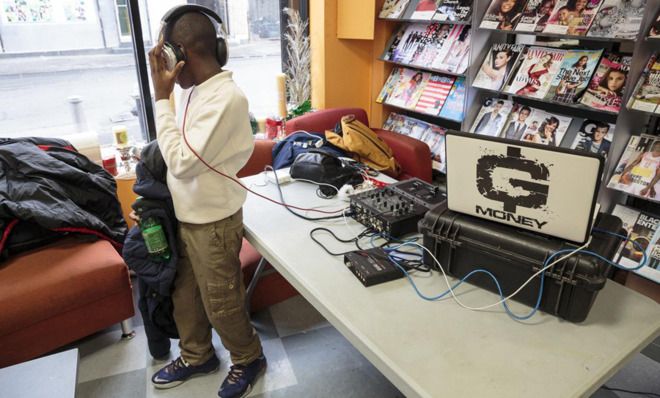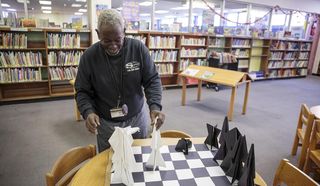What is a library?
Quaint vestige of the Gutenberg era, or cutting-edge panacea for social needs?


"Harlem Shake in a library? Yes!" cries the caption of a YouTube video uploaded last spring by the regulars of the Queens Library for Teens.
While watching dozens of teenagers decked out in parrot masks and Bugs Bunny costumes dancing, jumping, and spinning on rolling chairs across the frame, anyone is likely to wonder: This was allowed in a library? And upon entering the space where the clip was filmed, many people do ask: Thisis a library? Aside from a few small shelves of test-prep materials, this 3,000-square-foot room holds no books.
The teen library sits at the corner of Cornaga Avenue and Beach 20th Street in Far Rockaway. It opened in a former retail space in 2007 to resolve the mounting complaints from patrons at the Far Rockaway library branch a block away, who grumbled that the horde of teens descending on the facility every day after school was just too disruptive. The teen library is open from 2:30 p.m. to six p.m. Monday through Friday and admits only 12- to 19-year-olds — not their younger siblings, and not even their parents.
Subscribe to The Week
Escape your echo chamber. Get the facts behind the news, plus analysis from multiple perspectives.

Sign up for The Week's Free Newsletters
From our morning news briefing to a weekly Good News Newsletter, get the best of The Week delivered directly to your inbox.
From our morning news briefing to a weekly Good News Newsletter, get the best of The Week delivered directly to your inbox.
(More from Narratively: Kurt Thometz's little black bookshop)
Kim McNeil Capers, the teen library's director, laughs when she says, "Kids don't come in here to find books. They come here to find a girlfriend!" That's only partially true. Capers is a certified mental health counselor, and before she joined the library she supervised mental health programs for teens and children. Her face straightens when she adds: "When they come in here, we're going to get them the help they need."
It's a common refrain among those working in New York's public libraries these days: Because it's increasingly difficult to pin down exactly what kind of help they're supposed to offer, librarians have tried to make their mission pliable, and to offer whatever help people need, in whatever realm it may be. They're hardly limiting their offerings to intellectual pursuits.
In fact, no librarians work at the teen library — youth counselors run the place. And though it's devoid of books, the room holds plenty else. After the orange-sherbet walls, the rows of 40 computers are likely to be the first thing you notice. On the opposite wall, magazine racks house 70 subscriptions, and interspersed with those are salmon-and-green padded chairs. Upon entering one recent afternoon, a group of about 10 boys immediately pulled them into a circle to facilitate their noisy Yu-Gi-Oh! trading card game.
Sign up for Today's Best Articles in your inbox
A free daily email with the biggest news stories of the day – and the best features from TheWeek.com
When you get to the back of the room, you'll come upon the teens' most prized possession: a $70,000 recording studio, flanked by three editing stations. To one side of that is the gaming lounge, and to the other side a pool table, which will soon shift roles to serve as the foundation for a model town with a working model railroad. When the teens start to stream in, the air swells with friendly yelling, B.O., and the scent of fast food, but they aren't chided for shouting or snacking. This is a place for hanging out.
(More from Narratively: Print ain't dead in NYC)
However, what the teen library hopes to offer its young patrons is heftier than that. Far Rockaway struggles with high unemployment and the social issues common to areas with many low-income housing projects — problems that have only been compounded by the neighborhood's isolated location on a remote barrier beach, not to mention Hurricane Sandy, which came through in 2012.
The teen library's daily and monthly programs are tailored to this vulnerable population, hosting daily GED prep classes, an annual college fair, health classes, gang awareness programs, a chess club, CPR training, a Regents Exam prep club, a streaming radio station via the recording studio, an annual science fair, and scores of other activities.
The Queens Library for Teens is a reflection of what New York City's libraries have come to believe about themselves: They are in a position to do more than just connect their patrons to books and content.

* * *
That question has never been as difficult to answer as it is today. Just as the internet has given way to identity crises within journalism, publishing, and music, movie and television distribution, it has also confused what used to be libraries' central purpose: providing a singular portal to content for whomever cared to access it. With the World Wide Web blowing in and demanding recognition as the more singular portal to the world's content, libraries' painstaking cataloging of information that is now largely Google-able is looking a bit less critical.
It's an upheaval that calls for a more existential grappling than can be addressed by digitizing library content or installing rows and rows of new computers. Librarians have had to delve deeper and ask themselves fundamental questions about their role, such as, what can they offer that the internet can't?
(More from Narratively: Dear dusty old bookstore)
"Libraries are aggressively moving into a range of services that aren't necessarily related to book lending," says Lee Rainie, director of the Pew Research Center's Internet Project, a nonprofit research body that has published a series of reports about how technology is changing expectations of library offerings. "They are pretty radically rethinking their mission in the world," he said.
Major cities like New York may be the most progressive incubators for the trend. Rainie adds, "There's clearly something special that has happened in urban libraries, where they are thinking very seriously about the new services mix that they should offer to their patrons."
Library employees from each of New York City's three systems — New York Public Library (with branches in Manhattan, Staten Island, and the Bronx), Queens Borough Public Library, and Brooklyn Public Library — maintain that their institutions are in the midst of a role reappraisal.
"We're evolving our service model," says Thomas Galante, president and C.E.O. of the Queens Borough Public Library. He points to shifting budget priorities to illustrate. For example, when the libraries suffered deep funding slashes in the early 1990s and again in 2001, Galante and his colleagues delegated cuts based on where they'd have the least impact on circulation. Library locations with the most in-and-out book traffic stayed open six days a week, while those with more anemic circulations only opened their doors two or three.
But by the time libraries saw funding pull back again in 2008, priorities had reversed. The system's directors wanted to ensure that each of its 62 branches would open at least five days a week, so the books budget bore the brunt of the cutbacks as it was snipped in half.
"We know there are all sorts of other reasons why people walk through our doors — for programs, for computer access, for a place to get out of the heat," Galante says. "We thought that was more important than having twice as many new books on the shelves."
Brooklyn Public Library chief librarian Richard Reyes-Gavilan notes similar changes pervading his system. "I'd love to say we've made this conscious decision to sort of reevaluate our role in people's lives, but really all we're doing is responding to community needs," he says. "Our physical spaces are situated across the borough to deliver informal, nontraditional educational experiences, and that's what we're really moving into."

Reyes-Gavilan explains that when making hiring decisions, "we're not necessarily asking people anymore, 'Tell us what experience you've had with reader advisory or cataloging.'" Instead, he asserts, the system's higher-ups are more apt to value experience in education or social services.
All three of New York City's library systems are in the process of building out new departments and positions that more readily evoke a social worker's job description than that of a traditional librarian. In September, BPL launched its new Outreach Services Department, which will eventually consist of five full-time staff members tasked with expanding services for immigrants, senior citizens, and prison populations. In October, NYPL began hiring for the new role of "intake managers," library employees who will help patrons sift through the growing number of programs, and who will maintain a hands-on role after doing so, contacting patrons when, for example, they miss classes for which they've registered. For its part, the Queens system has six full-time and two part-time case managers — all hired since 2009 — who help visitors navigate the murky waters of government programs and services.
In the decade between 2002 and 2011, the number of programs offered across the city's 206 branches jumped 24 percent, and the number of attendees at those programs shot up by 40 percent, to 2.3 million, according to a Center for an Urban Future report.
These changes are making for an altogether different library experience. Galante says they have designated quiet rooms recently because "the rest of the library isn't as quiet."
"People tend to think of the libraries they grew up in," he adds. "But those are very different than walking into a public library today."
Read the rest of this story at Narratively.
Narratively is an online magazine devoted to original, in-depth and untold stories. Each week, Narratively explores a different theme and publishes just one story a day. It was one of Time's 50 Best Websites of 2013.
-
 The problems with the current social care system
The problems with the current social care systemThe Explainer The question of how to pay for adult social care is perhaps the greatest unresolved policy issue of our time
By The Week UK Published
-
 Austria's new government: poised to join Putin's gang
Austria's new government: poised to join Putin's gangTalking Point Opening for far-right Freedom Party would be a step towards 'the Putinisation of central Europe'
By The Week UK Published
-
 Silicon Valley: bending the knee to Donald Trump
Silicon Valley: bending the knee to Donald TrumpTalking Point Mark Zuckerberg's dismantling of fact-checking and moderating safeguards on Meta ushers in a 'new era of lies'
By The Week UK Published